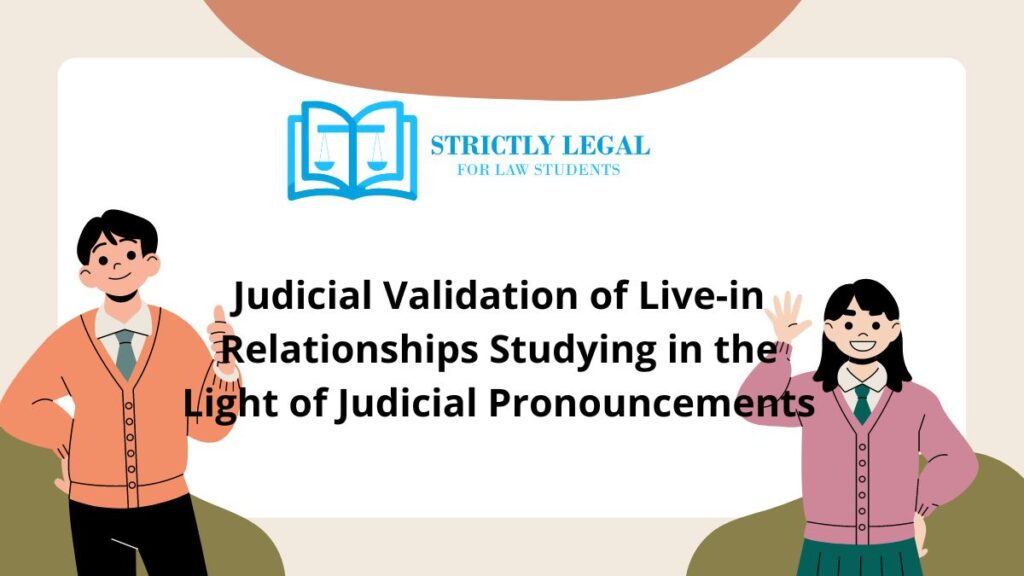The society of India is ever-changing. It has seen lots of tradition and customs and a great influence from the western culture. Every millenarian today supposes that the sacred knot of marriage is too binding or what is called in modern English as “suffocating” for them. An alternative for the same is a relationship without being held accountable and without anyone having to take responsibility. That is when the concept of live-in relationships was kindled. This type of relationship is generally entered into by both the parties being consensual, may it be to test the compatibility between each other before tying the knot or sometimes to smoothly elude the system of formal marriage. Let’s look at the present day youth. Almost everyone is preferring live-in relationships over a formal marriage or a formal commitment, which is also not so surprising thing to hear. There is still no legal objection in order to boycott this from the Indian society but nonetheless, there have been certain disagreements with regard to the same. Traditionally, in the India that was not so modernized before the concept of marriage was considered a cherished institution provided the woman was financially dependent on her husband which would ultimately lead her to be submissive. The evolution of “walk in walk out” concept seemed contrary to the very purity of the marriage. Nonetheless, irrespective of the difference of opinion from the substantial part of the population, the Honorable Apex Court has been rather noteworthy for providing protection to such couples.
Table of Contents
Word from the Judiciary
There is no terminology or statute for the so called modernized live-in relationship, nor has it got any recognition from any sort of Personal law in India. With the absence of any specification, the Honorable Apex Court tried to throw light on the same via the help of a case judgement, in the case of Badri Prasad v. Deputy Director of Consolidation, it endorsed the legal validity of a fifty year old in a live-in relationship and in the case of Payal Katara v. Superintendent Nari Niketan, Kandri Vihar, Agra and others; the Court contended that a man and a woman can live together even without getting married. Apart from that, it was also noted that this concept of live-in relationship is not illegal but might be immoral to the society. A few compute that the judiciary is neither prohibiting nor inspiring such a concept, but only exhibiting justice to keep in view the social and constitutional morality.
Nonetheless, to the surprise of the society, in the case of Khushboo v. Kanniammal and Anr., the Honorable Court contended that living together is a right to life. Khushboo, the actress reportedly inscribed pre-marital intercourse and a live-in relationship and her critics or haters accused her of performing nuisance. Nonetheless, the court gave a judgement in the favor of the actress sustaining the clear distinction between the law and morality of the society.
At last, to end the constant fight between the morality and the law, in the case of S.P.S Balasubramanyam v. Suruttayan, the Apex Court held that, if a man and a woman live under the same roof and cohabit for several years, a pertness or presumption shall exist u/s 114 of the Indian Evidence Act that the said couples live as a husband and a wife and the children/ child born (if) thereafter, will be considered as a legitimate child.
Pre-marital Agreements
A pre-marital agreement is a contract between two individuals or parties entered into, before tying the knot. It necessitates the idea of finances, personal liberty between the couple and also regarding the division of property in case of break up or divorce between them. However, such an agreement before the tradition of marriage are not so common and usual in India since they are not well versed and easily settled with the purview of the Indian traditions. In present day, the concept of pre-marital agreements with respect to marriage is more like an alien to not only the Indian tradition but also the Indian society.
Rights of a woman in the live-in relationship
The woman in the said relationship may allege her rights under the Protection of Women from Domestic Violence Act, 2003. The status of such a woman is not parallel but is however corresponding to that of a wife, only under one condition that the couple has lived together under the same roof for several years for a reasonable amount of time since the definition implies a relation in the nature of marriage.
In preparation for the recommendation of the National Commission for Women to the Ministry of Women and Children, the Honorable court endorsed that women can ask for maintenance from their male partners after their break up or so u/s 125 of the Criminal Procedure Code, 1973. [Read Abhijit Bhikaseth Auti v. State of Maharashtra and Others.]
Rights of a man in the live-in relationship
Very unfortunate for having realized this, but there are still no statutes or any law in India to protect the rights of a male person not only in terms of marriage or relationship but anything else in the world, for the society being harsh and torturing the women at past, the law has always been women oriented for their upliftment. As of now, only women can allege maintenance from their other partners as the Court also contended that “a live-in relationship is invariably initiated and perpetuated by men”.
Conclusion
The status of live-in relationships in a country like India is still quite unacceptable to many residing in a society for the traditions and culture being rigid and pacific. High rates of adultery that leads to divorce in already happened marriages, houses and emotions being broken down, neglect of children and many such social issues are a part of the reasons for the outright non acceptance of the live-in relationship culture. Furthermore, the Central Adoption Resource Authority (CARA) has barred the couples in a live-in relationship to adopt a kid as their committee held that cohabitation without the tradition of marriage cannot be a stable family in India.

Law student.
Turning legal insights into engaging narratives.





